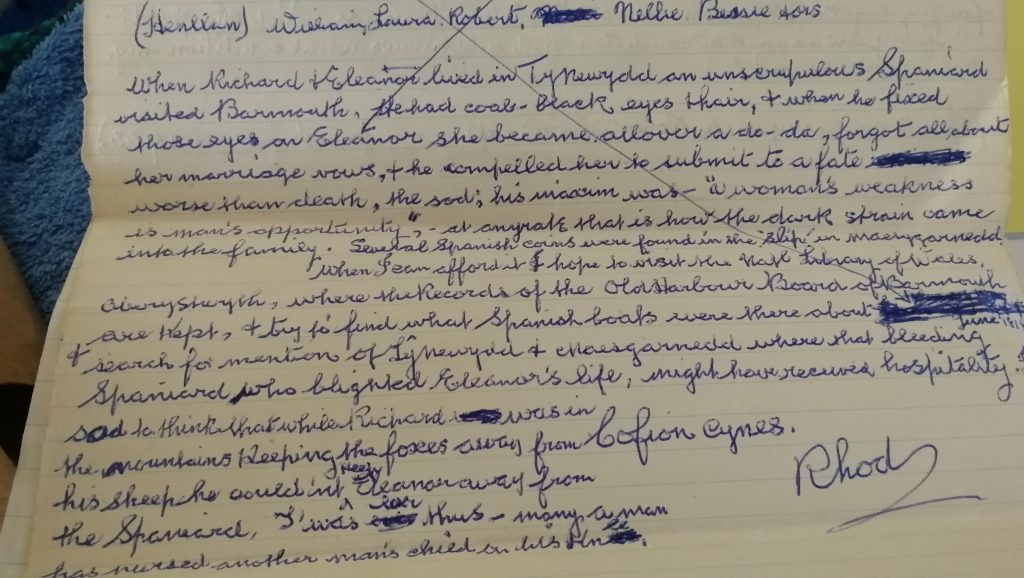One of the things about history is that sometimes it throws up much better plots than you could ever think of. I have been guilty in the past of using snippets from my own family’s history. Not every time, but sometimes stories can be formed on the basis of real events.
In ‘By the Banks of the Rheidol’, Mr Brown came from the story of my uncle, William Evans, an engine driver for the Great Western Railway. Originally from Henllan, near Denbigh he learnt his trade at Wolverhampton Stafford Road shed. in that town, he met and fell for a lady, who had born a child out of wedlock. To avoid the scandal of those times, when he moved to St Blazey shed in Cornwall, he changed his surname to hers. By the time he moved to Aberystwyth, the shed knew him as Billy Brown from Cornwall.
Also, the Canadian soldier in the soon to be released ‘The Long Way Home’, has his origins in William’s brother Robert, who emigrated to Halifax, Nova Scotia and during the Great War, joined up with the Canadian Army. Initially, they were based at Kinmel Bay, near Rhyl, which was a bicycle ride from his family home!
His family was fascinating. Their father, John was a devout Christian, who found it difficult to find work due to his beliefs. In the 1901 census, he is listed as a ‘castrator’. My Nain (North Walian for grandma), refused to acknowledge this, saying ‘he improved animal stock’!
The other two sons of John Evans both became drapers. Stanley was a draper in Canden Town, who joined the Royal Welsh Fusiliers and was lost at Paschendaele in 1917. Three days after field commission to Sergeant, he successfully repelled a trench attack, but succumbed to a direct hit of an artillery shell to the bunker he was in. He is on the wall at Tyne Cot.
Hugh George Evans joined the Liverpool Regiment and survived the trenches. In late 1918, the Liverpools were being shipped to the Middle East. As Hugh had already been wounded four times, he was spared this and was transferred to the Dorsets. Where in October 1918, in a supposedly pacified area in Peronne and now 2nd lieutenant, he was shot by a sniper. His grave is in the ceremony. I am glad to have visited both cemeteries and left the newspaper reports in memoriam.
Of the sisters, Laura Evans-Williams, was a singer of note, touring with her own concert troupe. She sang the chairing song in Birkenhead, when it was won posthumously by Hedd Wyn and settled in the US. her middle sister, Eleanor Fancourt sang at the D’Oyly Carte and for a time was music director. The youngest was Elizabeth, who’s claim to fame was bearing my father, but also to be screen tested at Pinewood. Although her film career was cut short by her sisters talking her out of moving into such a sordid industry as the silver screen…
Stories abound in history, as they are human, as they are about humans. As a final example, I present a picture of a little bit of family history from the Evans household in 1819, when one branch of the family ran a farm near Barmouth. The story reads as follows:
When Richard and Eleanor lived in Tynewydd, an unscrupulous Spaniard visited Barmouth. He had coal-black eyes and hair, and when he fixed those eyes on Eleanor, she became all over a do-da, forgot all about her marriage vows, and he compelled her to submit to a fate worse than death, the sod!
His mission was ‘ a woman’s weakness is a man’s opportunity, at any rate, that is how the dark strain came into the family. Several Spanish coins were found in the slip at Maesygarnedd.
When I can afford it, I hope to visit the Natl library of Wales in Aberystwyth, where the records of the old harbour board at Barmouth are kept, and try to find what Spanish boats were there about June 1819, and search for a mention of Tynewydd and Maesygarnedd where that bleeding Spaniard who blighted Eleanor’s life, might have received hospitality.
Sad to think that when Richard was in the mountains, keeping the foxes away from his sheep, he couldn’t keep Eleanor away from the Spaniard. ‘Twas ever thus – many a man had nursed another man’s child on his knee.
